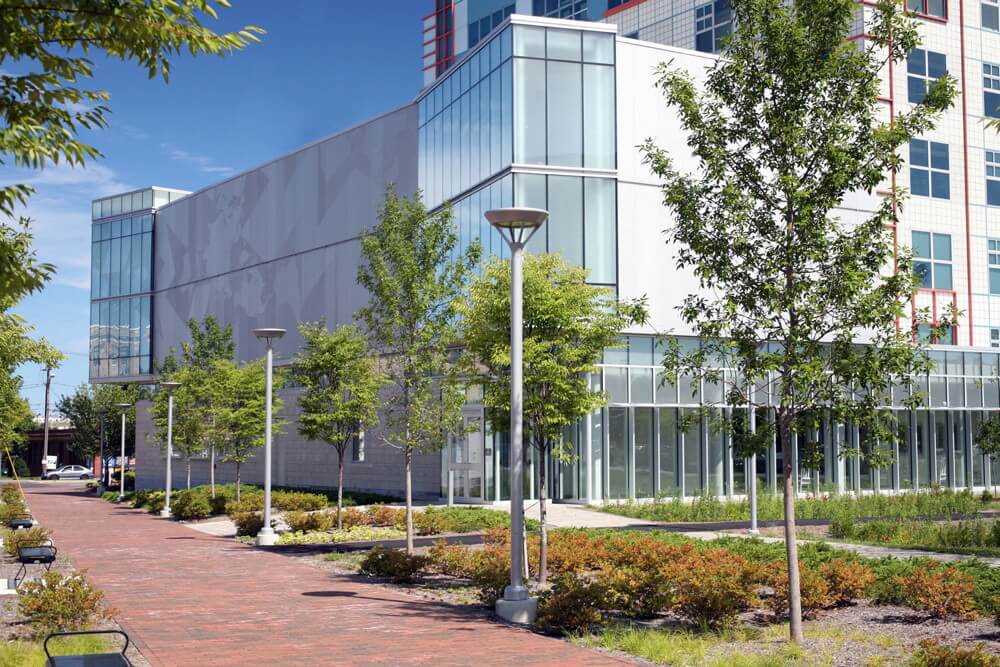

The Osher Map Library and Smith Center for Cartographic Education (OML) has been located on the Portland campus of the University of Southern Maine since 1994. Since 2009, it occupies the three-story building at the corner of Forest Avenue and Bedford Street (314 Forest Avenue); it is attached, on the first floor, to the seven-story Albert Brenner Glickman Family Library.
Founded in the spirit of lifelong learning and a deep commitment to our communities, the Osher Map Library and Smith Center for Cartographic Education at the University of Southern Maine enables free public access to and engagement with five centuries of cartographic materials via University, K-12, and public educational outreach; the preservation and digitization of our collections; gallery exhibitions; research and scholarship; and public programming that collectively promotes the continued relevance of maps and mapping as tools to help patrons understand the past and the present, and to imagine the future.
Adopted August 2020
We offer a land acknowledgment for Machigonne, the “truest name,” in Maliseet poet Mihku Paul’s words, of the now-called city of Portland, Maine, where the Osher Map Library and Smith Center for Cartographic Education sits on the campus of the University of Southern Maine.
We sit on land that was once water, and once part of a water-based ecosystem, which, for thousands of years before the French and English set foot on the neck, provided for the indigenous peoples of the Dawnland, the Wabanaki, and those who were here from the beginning in kinship with the land and the water.
We acknowledge this truth as we acknowledge the contemporary presence of the Abenaki, Penobscot, Passamaquoddy, Mi’kmaq, and Maliseet peoples—the Wabanaki Confederacy—and as we acknowledge the devastation of settler colonialism, past and present. We acknowledge, and invite you to do the same if you wish, that a land acknowledgment, no matter how sincere, is only a beginning to our collective work.
With nearly half a million cartographic items, the collections housed within the Osher Map Library and Smith Center for Cartographic Education (OML) at the University of Southern Maine are global in scope and date back to 1475. Currently there are over 75,000 items from our collections available to view freely online for educational and research purposes, and for the pleasure of viewing historic materials.
We present items from our collections (maps, atlases, rare books, posters, games, etc.) on our website in their original format. Due to the fact that many cartographic items were created within colonial and imperial structures and perspectives, often reinforcing racial hierarchies, it is important to let our many users know that within our digital collections, there are racist, sexist, and ableist images and narratives. We recognize that these images are hurtful, but should not be hidden away. We hope that by making such materials available to the general public we can encourage dialogue and critical thinking around past colonial/racist enterprises while also reckoning with the issues of our present.
-Continuing to seek out and expand our collections by prioritizing the acquisition of cartographic works made by and for underrepresented communities.
-Flagging collection items and historical materials that contain offensive or harmful images and/or language.
-Updating metadata and descriptive materials, with a commitment to authenticity. For example, we will continue to use the original titles and terms in descriptive metadata for historical accuracy. We do not change the title of an item, or the name of an historic group, e.g. the National Association for the Advancement of Colored People.
-Collaborating with scholars, students, curators, staff members, donors, and community members in our efforts to create descriptions, map commentaries and historical context statements that prioritize the voices of groups and individuals who have been left out of their own representation.
We encourage feedback and suggestions concerning these actions we are undertaking. Please feel free to contact us at oml-usm@maine.edu with any questions or comments.
To see other related statements from peer institutions please visit this list compiled by The Cataloging Lab.
Adopted May 24, 2021
Updated April 2022